- Home
- Rosanne Hawke
Daughter of Nomads Page 3
Daughter of Nomads Read online
Page 3
By the next morning, Jahani’s mind was made up. She loved Hafeezah, but she would tell her what she planned.
While they ate their chapatti crumble, she began: ‘Ammi, I want to travel north. Perhaps Zarah and Baqir can tell me why I am in danger.’
Hafeezah stared at her, stunned. ‘Bey ya, I forbid it.’
‘Ammi, you lied to me all these summers.’ Jahani pursed her lips. ‘I will go by myself if you won’t come.’
Hafeezah slumped onto a cushion and wept. Then she looked up at Jahani as if she didn’t know her. ‘Won’t you reconsider? It isn’t safe.’
Jahani knelt beside her. ‘Ammi, I love you, but I must do this. I can’t explain why.’
Hafeezah took in a shuddering breath. ‘I suppose you will not be happy until you meet your parents.’
Jahani’s eyes brightened.
‘But we must have an escort,’ Hafeezah said.
Jahani paused, uncertain. ‘What kind of escort?’
‘An armed one.’
Later that day, Hafeezah answered a knock on the door. Jahani quickly covered her head with her dupatta as a man stepped inside. He kissed Hafeezah’s hand to greet her in the northern way. He was tall and wore a leather vest over his qameez, soft leather boots – not sandals – and his forearms were encased in the wide leather bands that swordsmen and archers wore. His turban was wrapped as a mountain man’s with a simple cloth, but he made it look like a nobleman’s. Few men had been in their home, but this man was faintly familiar to Jahani.
It was obvious that Hafeezah knew the man because she smiled at him. She even spoke in Burushaski, and he understood. Jahani listened in shock. All these summers their language was such a secret and now Hafeezah was speaking it with a stranger.
She turned to Jahani. ‘This is the young man who brought you and Sameela home from the bazaar.’
There was a silence while all three remembered.
After a pause, Jahani recalled her manners. She rose, inclined her head and said, ‘Ju na, thank you.’
The man laid his right hand across his chest and said, ‘It was nothing.’ He raised his head to look at her. His face was fair and clean shaven; he was young, perhaps only four summers older than her.
Jahani grew still: the image of being carried in his arms came unbidden to her mind. She blinked her eyes to disperse it and hoped she wasn’t blushing.
‘How did you know where I lived?’ she burst out.
His glance switched to Hafeezah who inclined her head before he faced Jahani again.
‘Missahiba, I have been guarding you for a while. My name is Azhar Sekandar and I am at your service.’ He bowed his head slightly, but he did not kiss her hand in greeting.
Jahani was at a loss what to say. She felt even more like a person who had woken up and discovered she were someone else entirely. A guard. She had a personal protector and had never known? All those times she had been with Sameela in the bazaar or at her house, had this young man followed her and watched her? Was he the man she caught watching them before Sameela died? She narrowed her eyes at him. Men who guarded princesses and concubines in palaces were eunuchs, but Azhar was definitely not such a man. No doubt he knew much more about her than was fitting. Yet Jahani noticed he made an effort not to show this in his face and that alone appeased her.
‘I trust you have recovered, missahiba.’
She inclined her head to the side. ‘Ju na, thank you.’ Her arm was healing, but she’d never recover from losing Sameela.
Hafeezah addressed Jahani. ‘If you are still intent on journeying north to the mountains, all plans must be laid before Azhar. He will decide who else should come, when we go and how. Since he is your protector he will also accompany us.’ Hafeezah’s voice was firmer than Jahani had ever heard it.
Jahani switched her gaze to Azhar and noted the sword at his side, and the dagger tucked into his kamarband, his waistband. For a moment all she could do was stare at the embroidery on his belt. She’d only seen one worn by Sameela’s father before. Jahani lifted her head and caught Azhar openly appraising her. She didn’t say a word, but excused herself politely and retreated to the other room. What was the point of covering herself in his presence? He had already seen her face and for how long? Yet Hafeezah didn’t seem to find Azhar’s forwardness amiss. Had everything they believed in turned upside down as well?
If only she had Sameela to talk to. Should she still go north if Azhar was in charge? But now Hafeezah made it seem like a fait accompli and everything was probably being arranged while she sat there in shock.
Jahani rearranged her dupatta and walked back to the main room. Hafeezah seemed relieved to see her return and Jahani’s spirits rose a little. Perhaps not everything had changed. She knew Hafeezah still loved her even if she had lied about being her true mother.
Azhar rested against a carpeted cushion, sipping chai from a cup that looked too small in his hand. He barely glanced up as Jahani accepted a cup from Hafeezah and sat opposite him.
‘Azhar is saying we need to leave as soon as possible to reach Naran in the Kingdom of Kaghan.’
‘Why?’ Jahani asked.
‘The weather, missahiba,’ Azhar said. ‘It is a long journey of perhaps a moon and I do not want us to be caught in the wet season.’
‘Oh.’ Jahani took a mouthful of chai.
‘He also feels that we shouldn’t travel with a caravan,’ Hafeezah said.
‘Would we travel quicker by ourselves?’ Jahani asked.
Azhar put down his cup. ‘It is because of the danger. Not only has there been an attack on you but there is renewed unrest in the northern kingdoms. A caravan will be a target. A few people travelling alone may not.’ He looked up and Jahani felt the full force of his gaze. His eyes looked green from where she sat and they contrasted against his dark lashes. One thing was clear: Azhar was used to being in charge and it infuriated her.
Perhaps she had been too hasty about going north. ‘Ammi, I’m sorry if I spoke out of turn before. If you feel we should not go—’
‘Do not worry, Jahani,’ Hafeezah interrupted. ‘Azhar would have suggested it himself if you hadn’t.’
Jahani frowned. ‘Because I’m in danger?’
He inclined his head. ‘Awa, yes, missahiba.’
‘Why do you address me in that high-handed way? Please, just call me Jahani.’
‘As you wish, miss—’ Azhar stopped himself in time and regarded her calmly.
Was that a glint of humour she detected in his eyes? She turned away. No doubt he thought her a child. What was he? Just a guard and not a very polite one either.
Azhar turned to Hafeezah. ‘We leave before sunrise, kaka. After the early prayers. I will return in an hour to secure your belongings.’
‘Why so early?’ Jahani asked, her frown deepening.
Azhar smiled faintly. ‘Our leaving needs to be a secret.’ He stood in a fluid movement and the room seemed diminished. Then he bowed his head slightly to both of them with his hand over his heart.
Jahani watched him stride to the door and saw Hafeezah touch his arm in thanks. She stared. How could he call Hafeezah kaka, his older sister? The right side of his mouth curved in a smile as Hafeezah spoke to him. He dipped his head to hear her just as if he were a loving brother. But his final glance was for Jahani. There was something unsettling about him, but Jahani couldn’t put a name to it.
It wasn’t until Jahani was packing her bag that she realised she would be leaving all that she had ever known. And for how long? If Zarah and Baqir decided she should live with them again, she may never return.
‘Zarah.’ Jahani tested the sound of her mother’s name, but she felt nothing in her heart. How could a mother give up her child? Jahani couldn’t make sense of it, but she could tell Hafeezah had told her all she knew. The only way to discover more was to meet her birth parents.
Jahani picked up the little embroidered dress from her birth mother and Sameela’s wedding quilt. Most of her memories ha
d Sameela in them: Eid festivals, parties at Sameela’s house, sketching outfits and explaining them to the red-headed tailor. Sameela couldn’t stop giggling as she explained the intricacies of new fashion to the old man. ‘Nay nay, baba ji, like this, dekho, look.’ And she drew it again for him to see. Jahani had even had her nose pierced at Sameela’s house – one of Sameela’s servants poured perfume on her nose and poked a needle through with thread attached. Jahani squealed from the pain, but worse than that was the embarrassment of walking home with thread in her nose. She couldn’t wait until Hafeezah could buy her a nose-ring. But when her nose healed, Sameela had given Jahani one of her gold nose-rings. She still wore it.
Jahani buried her face in Sameela’s wedding quilt. Don’t weep for me, my Sameela dear, wear your gold bangles the whole year. She had written those lines less than a week ago; now Sameela was gone and she was the one crying. Jahani decided she would take the quilt to remember the love and memories that were stitched into it.
Before she packed her small red prayer rug, Jahani knelt on it in front of the unshuttered window and said, ‘Qhuda, I go north for you and for Sami, whatever the danger. Forgive me, for it is my fault she died. Help me discover why.’
When she finally stood and glanced out the window she saw Azhar. He had brought three horses. They were dark in colour and shifted restlessly in the evening mist. The darkest horse proudly tossed its head as its tail swished in the air. A bow and quiver of arrows were attached to its saddle and a rolled carpet was tied behind it. The horse stamped its feet until Azhar murmured in its ear. Jahani wondered how Hafeezah could afford them, but perhaps they were financed by Zarah and Baqir.
She draped a light shawl over her hair and defiantly carried out her packed carpet bag, without Hafeezah’s help, to Azhar. She watched as he tied it with ropes onto a horse.
‘Bring a blanket in the morning,’ he said in Burushaski. ‘You’ll need it to put on the saddle.’ He smiled at her and she noticed the laughter lines near his mouth.
It was strange being able to speak in a secret tongue with another person besides Hafeezah, but she was reluctant to ask how he learned it. It had been a secret for so long.
Just then the horse with the tossing head pushed its nose into her back as if asking for a treat.
Azhar started in surprise. ‘He never does that to anyone but me.’
Jahani stroked the horse’s red-brown face, noting its curled ears. ‘Is he your horse?’
‘Awa, yes. His name is Rakhsh.’
‘Like the name of Rostam, the hero’s mount?’
Azhar glanced at her with raised eyebrows. ‘You know the old Persian stories?’
‘Some. He’s the same colour as Rostam’s horse, but I hope he has a kinder death.’
There was a silence while Jahani remembered the story: Rostam’s evil half-brother lured him and Rakhsh to a pit with stakes. The heroic Rakhsh and Rostam were both impaled.
Azhar gestured to the horse standing beside Rakhsh. ‘This one’s name is Chandi.’ He patted the mare’s neck. Her long hair was copper brown and she had a white face.
‘She’s beautiful but she’s not entirely white like the chand, the moon.’ Chandi snuffled and Jahani imagined the mare was amused.
Azhar frowned. ‘White horses are too easy to follow.’
Jahani stretched her hand forward to pat Chandi and the horse responded with a happy whinny.
‘And Hafeezah’s mount?’ Jahani moved to the last horse.
‘Sitarah, star.’ She stroked the white star on the horse’s forehead.
‘Rakhsh is a Marwari horse, but Chandi and Sitarah are Zanskari ponies. All are rugged and sure-footed, bred high in the Qurraqoram Mountains and can withstand the cold and travel tirelessly. They are warhorses.’ Azhar paused. ‘Chandi is worthy of you, but the wooden saddle isn’t. So don’t forget the blanket.’
Jahani chewed her lip. What did he mean by ‘worthy’? Was he making fun of her? At least he’d stopped calling her missahiba. Men in the bazaar addressed Sameela that way because of her father’s position in the village, but never Jahani.
Jahani turned and stared sadly at the little mud house, the only home she’d ever known. Now that she’d asked to leave, she found she would miss where she had grown up.
Since Azhar had brought mountain horses, Jahani supposed they could be traversing difficult terrain. Then she remembered his words: They are warhorses. A cold sensation crept over her. Why would they need such horses? Her mind swirled with what the next few moons may bring: travel, danger, a new home. If she lived with her birth parents would Hafeezah stay with her? Tears slipped down her cheek and she ran inside to throw herself on her charpai.
That night Jahani dreamed of high mountains and green fields full of flowers. She sat astride a pony, and an older boy with brown hair rode a white horse beside her. They dismounted to eat lunch by a blue lake and a huge snow cat padded over and licked her face. After they had eaten, the boy lifted her onto the pony and they rode near a river. Its water was white and roared so loudly she couldn’t understand what the boy said, but he spoke seriously to her as if she were older. She wished she could hear his words for she knew it was something she needed to know.
4
Jask Persia Safavid Empire
The moon rose over the minarets as Azhar flew south-west toward Persia. How Jahani would be shocked to see him on a carpet touching the sky.
He glanced down. There was little to see in the darkness except for a few specks of light, but he knew he was passing over Qandahar and the deserts of the Afghans. He stroked the Persian carpet and it rippled under his fingers. It was happy to fly – the carpet was almost an extension of his own personality – yet he could never explain how he knew this; it was instinct. The carpet was ancient and faded in places but it was still beautiful with its many colours. Gazelles, leopards, peacocks and flowers shone like silk as if they had been painted.
Jahani filled his thoughts again. It had been incredible to finally meet her, formally, in Hafeezah’s house. He frowned. But she had shown no sign of recognition. Had he changed so much?
When Azhar was almost seventeen summers, his foster father Kifayat Ullah had told him she was still alive, though hidden. He wanted to go to her immediately but Kifayat said it wasn’t time. Wait another summer, he had said. It was the longest twelve moons of his life. But Kifayat enforced it, so that Azhar could master flying the carpet; it was the quickest way to reach her. The carpet also meant he could easily fly back to Jask no matter where he was in the kingdoms to report to Kifayat. He sighed. This was Kifayat’s condition for letting him go to Jahani alone: to regularly visit.
A summer later, Azhar was ready. He found Jahani in Sherwan – the village they had taken her so many summers ago – and, with Hafeezah’s knowledge, Azhar became her secret protector. It took all of his self control not to make himself known to Jahani. He wanted to tell her all he knew, but Kifayat had forbidden it as it may upset her life, perhaps even destroy it.
The gulf glinted in the moonlight ahead. ‘Neechay jao.’ He uttered the words to descend, touching the right side of the carpet to turn it downward. It alighted onto the roof of a courtyard.
‘Mamnoon, thank you,’ he whispered to the carpet.
It rippled toward him in response and he rolled and hoisted it onto his shoulder.
Azhar opened a door to find Kifayat writing at his desk. After propping the carpet gently by the door, he hurried forward to embrace him. ‘Pedar, Assalamu Alaikum, peace be upon you.’
‘Wa Alaikum Assalam, and upon you, Pesar, my son. How goes it with you? Did you travel well?’ After their greetings, they spoke in Persian, the language of the Mughal court. ‘You have become the Eid moon, aziz – I hardly see you.’
Azhar sank to touch Kifayat’s feet and when he rose Kifayat was smiling. ‘I am well, Pedar.’
‘And the girl?’
‘She is safe.’
‘You have finally met her again?’
&nbs
p; Azhar inclined his head.
‘Does she suspect anything?’
‘Not yet.’
His father stood back to regard him. ‘What means this “not yet”?’
‘It means because she has been educated, she is sharp of mind and I’m hoping she will work it out naturally herself.’ Azhar’s tone was dry but approving. ‘I suspect she knows little of the real world.’
Kifayat made an expression of interest. ‘Mmm. It is good she is educated, but I didn’t think her ayah was literate.’
‘Hafeezah isn’t, but she has taught her the Hahayul language, Burushaski, and her culture. As you had thought, it has worked well to have the girl in Hafeezah’s care. She now knows of the northern kingdoms and speaks the language as a mother tongue. And she has also shared the tutor of her friend Sameela, the daughter of Malik Habib.’
His father looked at Azhar sharply. ‘Not the same family we met in the emperor’s court in Agra after we fled Nagir?’
Azhar nodded. ‘His brother still serves there.’
‘But these people in Sherwan, do they not guess who she is? Malik Habib would surely. He’d be able to tell by her colouring. Does she still have red hair and blue eyes?’
‘Baleh, yes. She is tall and has the grace of a mountain girl with eyes shaped like almonds—’ He managed to stop himself from saying she was as lovely as the moon. ‘Yet I don’t think they suspect. Not even Hafeezah realises. She only knows Jahani is in danger, but not why.’ He paused and when he spoke again, concern lowered his tone. ‘It is like a pea hen raising an eaglet. When the chick needs to fly, I’m afraid the hen will not be strong enough to catch her when she plummets.’
Kifayat gazed up at his son. Azhar was taller than he was now. ‘Jahani, is it?’ He put his arm around Azhar’s shoulders. ‘Do not forget, Pesar, if we know where she is, then others may discover her also. Every mir and war lord has his spies as does the great emperor. Though I doubt he would concern himself with tiny mountain kingdoms.’
‘An attempt has already been made on her life. Her friend was killed instead.’ Azhar recalled the moment with regret. He’d shoved Jahani aside, but then the blade had found the other girl.

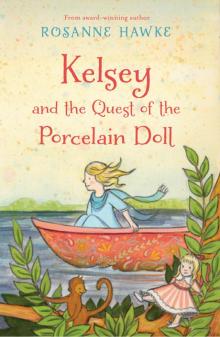 Kelsey and the Quest of the Porcelain Doll
Kelsey and the Quest of the Porcelain Doll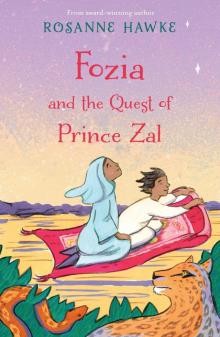 Fozia and the Quest of Prince Zal
Fozia and the Quest of Prince Zal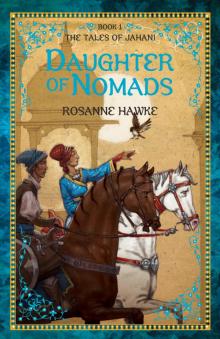 Daughter of Nomads
Daughter of Nomads The Truth About Peacock Blue
The Truth About Peacock Blue Taj and the Great Camel Trek
Taj and the Great Camel Trek The War Within
The War Within Killer Ute
Killer Ute Shahana
Shahana Kerenza: A New Australian
Kerenza: A New Australian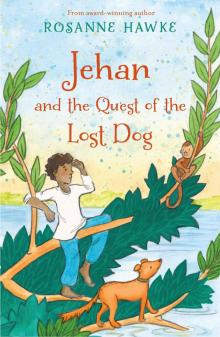 Jehan and the Quest of the Lost Dog
Jehan and the Quest of the Lost Dog Sailmaker
Sailmaker Zenna Dare
Zenna Dare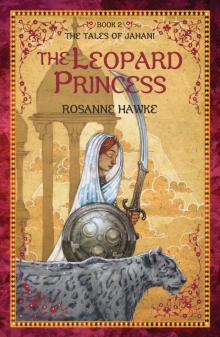 The Leopard Princess
The Leopard Princess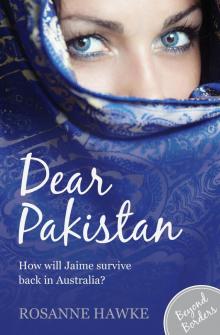 Dear Pakistan
Dear Pakistan Marrying Ameera
Marrying Ameera Finding Kerra
Finding Kerra Spirit of a Mountain Wolf
Spirit of a Mountain Wolf